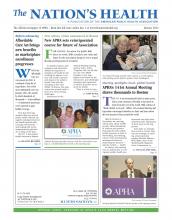Young adults who combine alcohol with energy drinks consume even more alcoholic beverages than those drinking alcohol alone, according to a recent study, and can put their health at risk.
People who mix highly caffeinated energy drinks with alcohol tend to be “wide awake drunk,” which could lead to consequences such as alcohol poisoning or behaviors that affect others, such as drunken driving, according to a study published online in December in the Journal of Adolescent Health.
“People need to be aware that having energy drinks and alcohol on the same day may pose a risk,” said study co-author Megan Patrick, PhD, a research assistant professor at the University of Michigan’s Institute for Social Research. “In this study, it was not even necessarily consuming them in the same glass or at the same time, but just consuming them on the same day that increased risk for negative consequences.”
Data was taken from four 14-day online surveys on alcohol and energy drink use among more than 500 Pennsylvania State University students from the spring semester of their sophomore year to the fall semester of their senior year.
Students were asked each day about how many energy drinks, alcoholic drinks and drinks that mixed both they had the previous day. They also listed when they started and finished drinking and what happened as a result of the drinking, such as whether they had a hangover, the study said.
Research showed that students who had more energy drinks in general tended to drink more alcoholic beverages and spent a longer time consuming more alcohol. The students also had higher peaks in their blood alcohol content, the study said.
The students were also more likely to report being drunk and experience negative consequences for consuming a mix of both, the study said.
“People who consume energy drinks and alcohol are combining the stimulant effects of caffeine and the depressant effects of alcohol,” Patrick told The Nation’s Health. “This combination can make people feel less drunk, when they are actually just as impaired by alcohol. This can have serious consequences, for example if people don’t realize how intoxicated they actually are and decide to drive home.”
While the Food and Drug Administration has banned the manufacturing of pre-mixed beverages containing caffeine and alcohol as of 2010, the future regulation of highly-caffeinated energy drinks is still under FDA investigation. And the mixing of drinks is still prevalent in bars where patrons can mix the drinks themselves, the study said.
Study researchers suggested a prevention program that educates the public about the risks of mixing energy drinks and alcohol. They also recommended uniform labeling for products that contain high amounts of caffeine or alcohol about the potential harm.
For more information on this study, visit http://www.jahonline.org/article/S1054-139X%2813%2900511-9/fulltext.
- Copyright The Nation’s Health, American Public Health Association












